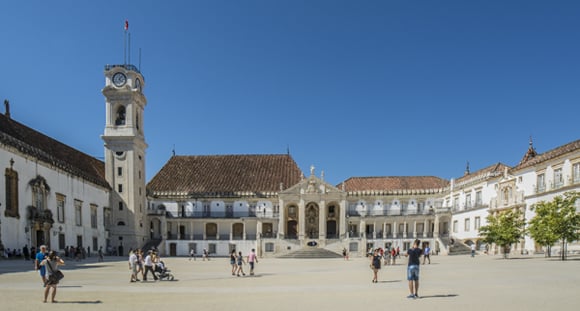Moving to Coimbra, Portugal
Last updated on Dec 17, 2024
Summary: Moving to Coimbra, Portugal? Expats talk about what you need to know before moving to Coimbra.

What do I need to know before moving to Coimbra?
When we asked people what advice they would give someone preparing to move to Coimbra, they said:
"Coimbra is a city steeped in history and culture, known for its prestigious university and beautiful architecture. Before moving to Coimbra, expats should know that the official language is Portuguese, and while English is commonly spoken in tourist areas and by younger generations, it may not be widely spoken by older locals. The cost of living in Coimbra is generally lower than in larger cities like Lisbon or Porto, but it's still important to budget carefully. The city is known for its high quality of life, with excellent healthcare, education, and public transportation systems. Coimbra has a Mediterranean climate, with hot summers and mild, rainy winters. The city is also quite hilly, which can make getting around on foot challenging for some. The cuisine in Coimbra is rich and varied, with a focus on seafood and local produce. Traditional Portuguese dishes like bacalhau (codfish) and pastel de nata (custard tart) are must-tries. Coimbra is a safe city with a low crime rate, but like any urban area, it's important to stay vigilant and aware of your surroundings. The city is home to the University of Coimbra, one of the oldest universities in the world, and as such, it has a vibrant student population. This means there's a lively nightlife scene, with plenty of bars, clubs, and cultural events to enjoy. Finally, it's important to note that bureaucracy can be a challenge in Portugal. Whether it's dealing with property rentals, setting up utilities, or navigating the healthcare system, processes can be slow and paperwork-heavy. It's recommended to seek advice from local experts or fellow expats to help navigate these systems," said one expat who made the move to Coimbra.
How do I find a place to live in Coimbra?
We asked expats how they chose their neighborhood and found a place to live. They answered:
"Finding a place to live in Coimbra involves several steps. First, you need to determine your budget and the type of accommodation you're looking for. This could range from a shared apartment to a private house. Next, you should research the different neighborhoods in Coimbra to find one that suits your lifestyle and preferences. Some popular areas include the city center, Celas, and Santa Clara. Once you have a clear idea of what you're looking for, you can start your search. There are several online platforms where you can find listings for rentals in Coimbra. Websites like Idealista, OLX, and Uniplaces are popular options. You can also use a real estate agent to help you find a place. They can provide you with listings that match your criteria and arrange viewings. However, keep in mind that you'll likely have to pay a fee for their services. When you find a place you're interested in, make sure to visit it in person before making any commitments. Check the condition of the property, ask about any additional costs such as utilities or community fees, and try to meet the landlord or property manager if possible. Finally, once you've found a place you're happy with, you'll need to sign a rental agreement. Make sure to read it carefully and understand all the terms before signing. You'll also typically need to provide a deposit, which is usually equivalent to one or two months' rent. Remember, finding a place to live can take time, so start your search well in advance of when you plan to move," remarked one expat who made the move to Coimbra.

Portugal Residency Advisors is a full-service consulting firm dedicated to providing personalized services to individuals and families seeking to relocate to Portugal. With a team of experienced professionals and strategic partnerships, we are well-positioned to assist clients with all aspects of the relocation process.
Click connect to have our partner contact you via e-mail and/or phone.

Portugal Residency Advisors is a full-service consulting firm dedicated to providing personalized services to individuals and families seeking to relocate to Portugal. With a team of experienced professionals and strategic partnerships, we are well-positioned to assist clients with all aspects of the relocation process.
Click connect to have our partner contact you via e-mail and/or phone.
What is a typical expat home or apartment like in Coimbra?
"A typical expat home or apartment in Coimbra, is often located in the city center or in the quieter residential areas. These homes usually have a traditional Portuguese architectural style, with white-washed walls, terracotta roofs, and often feature balconies or terraces. The interiors are typically modern and well-maintained, with fully equipped kitchens, spacious living areas, and one to three bedrooms. Some apartments may offer stunning views of the city or the Mondego River. Many expats choose to live in apartments within walking distance to local amenities such as markets, restaurants, and cultural sites. Some homes may also have access to a communal swimming pool or garden area. Despite the old-world charm of the buildings, most homes are equipped with modern conveniences such as internet, air conditioning, and heating systems," remarked one expat who made the move to Coimbra.
What is the average cost of housing in Coimbra?
If you are thinking about moving to Coimbra, cost of living in probably a key consideration. Expats commented about the cost of housing:
"The average cost of housing in Coimbra can vary greatly depending on the location and size of the property. For instance, the cost of renting a one-bedroom apartment in the city center may be around €500 per month, while the same kind of apartment outside the city center may cost around €350 per month. If you're looking to buy property, the average price per square meter in the city center can be around €2,000, while outside the city center it may be around €1,500. However, these prices can fluctuate based on market conditions and other factors," said one expat in Coimbra.
Should I buy or rent a home in Coimbra?
If you have not spent a lot of time in Coimbra, you should rent before even thinking about buying. We asked expats there about the buy vs. rent decision:
"The decision to buy or rent a home in Coimbra, largely depends on your personal circumstances, financial situation, and long-term plans. If you plan to stay in Coimbra for a long period, buying a home could be a good investment. Owning a home allows you to build equity over time and could provide financial stability in the future. However, buying a home also comes with additional costs such as maintenance, property taxes, and insurance. It also requires a significant upfront investment for the down payment and closing costs. Therefore, if you're not financially ready for these expenses, renting might be a better option. Renting a home in Coimbra offers more flexibility. It's a good option if you're not sure about your long-term plans or if you prefer not to deal with the responsibilities of homeownership. Renting can also be more affordable in the short term, as it typically requires less upfront money and the landlord is responsible for maintenance and repairs. In addition, the real estate market conditions in Coimbra should also be considered. If the market is favorable for buyers and you have the financial means, it might be a good time to buy. On the other hand, if the market is more favorable for renters, or if home prices are high compared to your budget, renting might be the better choice. Lastly, consider your lifestyle preferences. Some people prefer the freedom and flexibility that comes with renting, while others prefer the stability and potential financial benefits of owning a home. In conclusion, the decision to buy or rent a home in Coimbra, Portugal, should be based on your financial situation, long-term plans, and personal preferences. It's recommended to consult with a real estate professional or financial advisor to help make the best decision for your circumstances," commented one expat who made the move to Coimbra.
What should I pack when moving to Coimbra?
We asked people living in Coimbra to list three things they wish they had brought and three they wish they had left behind. They responded:
"When moving to Coimbra, you should pack a variety of clothing suitable for a Mediterranean climate, including lightweight clothing for the warm summers and heavier, layered clothing for the cooler winters. Don't forget to pack a good quality raincoat and umbrella, as Coimbra can experience heavy rainfall, especially in the winter months. Comfortable walking shoes are a must, as the city is known for its hilly terrain and cobblestone streets. If you plan on swimming at the nearby beaches, pack your swimwear, beach towel, and sunscreen. Bring any prescription medications you need, along with a copy of your prescription. It's also a good idea to pack a basic first aid kit. If you're planning on cooking, you might want to pack some of your favorite spices or hard-to-find ingredients, as they may not be readily available in Coimbra. Remember to pack all necessary travel documents, including your passport, visa documents, and driver's license. Pack your electronics, including your laptop, smartphone, and chargers. An adapter plug for European outlets would also be useful. Lastly, consider packing some personal items that will make your new place feel like home, such as photos, small keepsakes, or your favorite books," remarked one expat in Coimbra, Portugal.
 Portugal Residency Advisors
Portugal Residency AdvisorsConnect
Portugal Residency Advisors is a full-service consulting firm dedicated to providing personalized services to individuals and families seeking to relocate to Portugal. With a team of experienced professionals and strategic partnerships, we are well-positioned to assist clients with all aspects of the relocation process.
Click connect to have our partner contact you via e-mail and/or phone.
 Portugal Residency Advisors
Portugal Residency AdvisorsPortugal Residency Advisors is a full-service consulting firm dedicated to providing personalized services to individuals and families seeking to relocate to Portugal. With a team of experienced professionals and strategic partnerships, we are well-positioned to assist clients with all aspects of the relocation process.
Connect
Click connect to have our partner contact you via e-mail and/or phone.
What cultural faux pas should I try to avoid making in Coimbra?
We asked people in Coimbra if they could share any humorous cultural blunders they commited. For new expats, keep in mind that these incidents are an inevitable part of expat life. Learning to laugh about them is the key!:
"When visiting Coimbra, it's important to respect the local customs and traditions to avoid any cultural faux pas. Here are some tips: Avoid discussing politics, religion, and the country's history with the Salazar regime unless you are well-informed about these topics. These can be sensitive subjects for many Portuguese people. Do not compare Portugal to Spain. Although they are neighboring countries, they have distinct cultures, languages, and histories. Avoid speaking Spanish to locals assuming they will understand. While many Portuguese people can speak or understand Spanish, it's respectful to attempt to speak Portuguese or English. Do not rush meals. In Portugal, meals are a time for relaxation and socializing. It's considered rude to rush or to eat on the go. Avoid being loud or boisterous in public places. Portuguese people are generally reserved and appreciate quiet and calm. Do not wear beachwear in the city. It's considered inappropriate to wear revealing clothes anywhere other than the beach. Avoid being late. Punctuality is appreciated in Portugal, especially for business meetings or formal events. Do not forget to say "please" and "thank you". Politeness is highly valued in Portuguese culture. Avoid littering. Portugal is known for its cleanliness and locals take pride in keeping their cities clean. Do not ignore queues. Whether it's at a bus stop or in a shop, it's important to wait your turn. Avoid over-tipping. In Portugal, it's customary to leave a small tip, but anything over 10% is considered excessive," said one expat in Coimbra.
What are medical services in Coimbra like?
When we asked expats and global nomads about the quality of medical care in Coimbra, they replied:
"Coimbra has a severe problem with administration and issuing SNS numero de utente (health care number)," wrote one expat living in Coimbra.
About the Author
 Betsy Burlingame is the Founder and President of Expat Exchange and is one of the Founders of Digital Nomad Exchange. She launched Expat Exchange in 1997 as her Master's thesis project at NYU. Prior to Expat Exchange, Betsy worked at AT&T in International
and Mass Market Marketing. She graduated from Ohio Wesleyan University
with a BA in International Business and German.
Betsy Burlingame is the Founder and President of Expat Exchange and is one of the Founders of Digital Nomad Exchange. She launched Expat Exchange in 1997 as her Master's thesis project at NYU. Prior to Expat Exchange, Betsy worked at AT&T in International
and Mass Market Marketing. She graduated from Ohio Wesleyan University
with a BA in International Business and German.
Some of Betsy's articles include 12 Best Places to Live in Portugal, 7 Best Places to Live in Panama and 12 Things to Know Before Moving to the Dominican Republic. Betsy loves to travel and spend time with her family. Connect with Betsy on LinkedIn.
Other Questions:
- What should I pack when moving to Coimbra?
- Where should I setup a bank account in Coimbra?
- Will I be able to find a job in Coimbra?
- What is life like as an expat in your area?
- What do expats in Coimbra appreciate most about the local culture?
- What do expats find most challenging?
- Is there a lot of crime in Coimbra?
- Is there a lot of diversity? Are people in Coimbra accepting of differences?
- What are the schools in Coimbra like?
- How are healthcare services in Coimbra?
- What are medical services in Coimbra like?
- Are healthcare and health insurance expensive in Coimbra?
- What are emergency services like in Coimbra?
- Will I need to travel to see a specialist?
- Are common prescription medications available in Coimbra?
- How are local medical facilities in Coimbra?
- As a foreigner living in Coimbra, will I have access to public healthcare? What is it like?
- What have your experiences during the pandemic with the local healthcare system been like?



